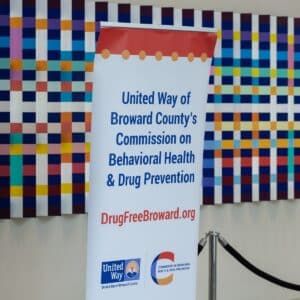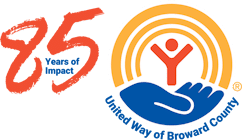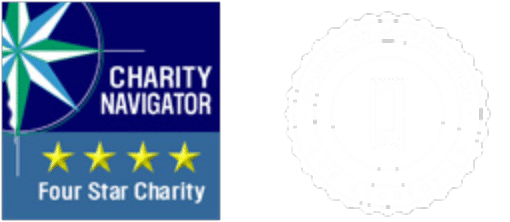United We Can Empower Our Community to End Overdoses
by Angela Ventura, MA, Director of United Way of Broward County’s Commission on Behavioral Health & Drug Prevention

The theme for International Overdose Awareness Day in 2024 is “Together We Can” — and this theme emphasizes the power of our community to address this crisis.
United Way of Broward County regards International Overdose Awareness Day as extremely important. One of three pillars of our United Way’s mission is Health, and our staff and community partners are committed to helping people in our community navigate through a variety of struggles so they will find a sense of hope and purpose.
For us, International Overdose Awareness Day is a time to:
- promote awareness by presenting vital information to save people’s lives
- open channels to improved mental and physical well-being
- create impact by sharing evidence-based practices and strategies to increase prevention

For the past 20 years, the significant increase in deaths caused by overdoses of fentanyl and other opioids has been a serious epidemic in the U.S.
However, in Broward County, United Way of Broward County’s Commission has delivered a wide range of measurable, tangible results across our community to defuse this epidemic. Highlights include:
- From 2021 to 2022, drug occurrences among deceased persons in Broward County decreased in all major drug categories (e.g., heroin, fentanyl, methamphetamine, cocaine, and prescription opioids).
- Among students from grades 6 to 12 in Broward County, alcohol use has decreased from 46.2% in 2012 to 21.5% in 2022, marijuana use has decreased from 23% in 2012 to 9.8% in 2022, and prescription amphetamine misuse has decreased from 3.1% in 2016 to 1.9% in 2022.
- The number of Broward County students who think it would be wrong to use substances increased between 2012 and 2022 for the following: smoking cigarettes (88.4% vs 96.6%), drinking regularly (69.1% vs 84.7%), smoking marijuana (74.4% vs 81.2%), and using illicit drugs (94.9% vs 98.2%).
- The number of Naloxone administrations in Broward County has increased from 4% in 2018 to 11% in 2022.
In addition to the collective power of the Commission, you and every person in our community can be instrumental in creating a healthier, stronger Broward County. We all know someone who has struggled with substance use, and we can all make a difference — whether it’s for our friends, co-workers, or loved ones.
Here are ways you can identify the signs of a potential overdose and then take specific actions to save a person’s life.
1) If you suspect someone is experiencing an overdose, call emergency services — getting immediate help to a person in crisis is critical.
2) Know the common signs to monitor when an overdose may be occurring, and examples include:
- Unresponsiveness: difficulty waking the person up or complete unconsciousness
- Breathing issues: slow, irregular, or stopped breathing
- Abnormal pulse: erratic or very slow heartbeat
- Skin changes: blue or purple lips and fingertips or very pale, clammy skin
- Vomiting: especially if the person is unconscious, as it can lead to choking
- Seizures: uncontrolled shaking or convulsions
3) Follow these actions:
- Dial 911 immediately. You also can call the Poison Control Center at 1-800-222-1222 for guidance.
- Check responsiveness. Try to wake the person up by calling their name or gently shaking them.
- Administer Naloxone (Narcan): If you have Narcan and suspect an opioid overdose, administer it according to the instructions.
- Perform CPR: If a person is not breathing or has no pulse, begin CPR if you are trained to do so.
4) While waiting for help, you should:
- Stay with the person, keep them awake, and monitor his/her breathing and pulse.
- Place them in the recovery position (on their side) to prevent choking.
- Avoid giving food or drink because it could cause choking or worsen the situation.
5) Also consider these important steps:
- Inform the emergency responders about any substances the person may have taken (if known).
- Stay with the person until help arrives.
- Know you have legal protections when seeking help for an overdose.

For longer-term prevention strategies, another useful resource to consider is our United Way’s Prevention Resource Center. It provides a wide range of free educational toolkits, podcasts, videos, and more to support and advance prevention of substance use in Broward County.
Join our United Way in honoring the importance of International Overdose Awareness Day. Show your support for this powerful day on your social channels, and spread the message of hope to end overdose. Using the hashtags #UWBC, #TogetherWeCan, #IOAD2024, and #EndOverdose can bolster the reach of your message.
Your actions, no matter how small they might seem, contribute to a collective effort in creating a community that values mental and physical health — and at our United Way, we know being informed saves lives.

